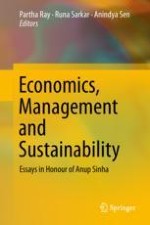2018 | OriginalPaper | Buchkapitel
Sustainable Eco-Management: Participatory Mechanisms and Institutions
verfasst von : Sarmila Banerjee
Erschienen in: Economics, Management and Sustainability
Verlag: Springer Singapore
Aktivieren Sie unsere intelligente Suche, um passende Fachinhalte oder Patente zu finden.
Wählen Sie Textabschnitte aus um mit Künstlicher Intelligenz passenden Patente zu finden. powered by
Markieren Sie Textabschnitte, um KI-gestützt weitere passende Inhalte zu finden. powered by
